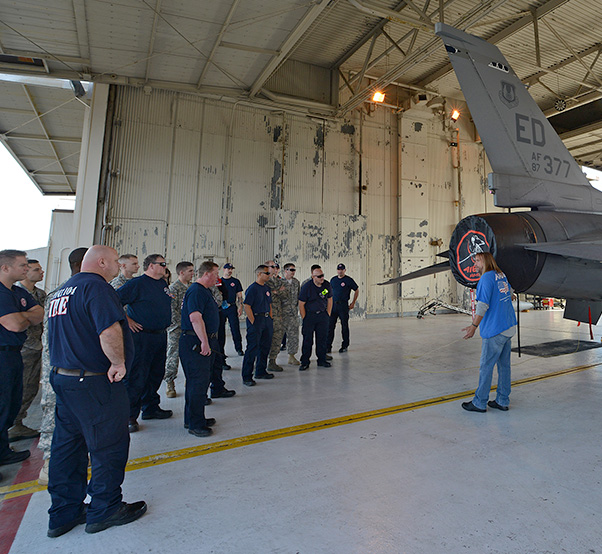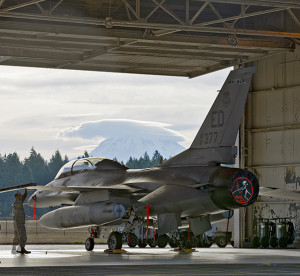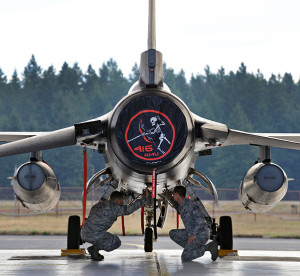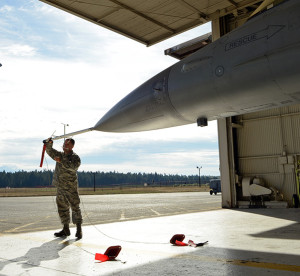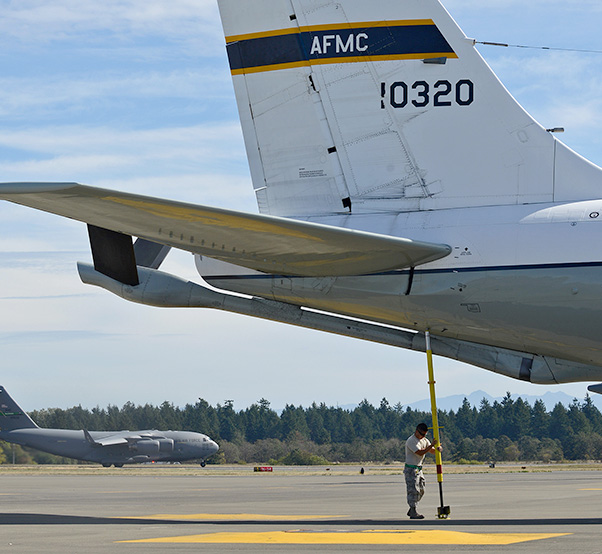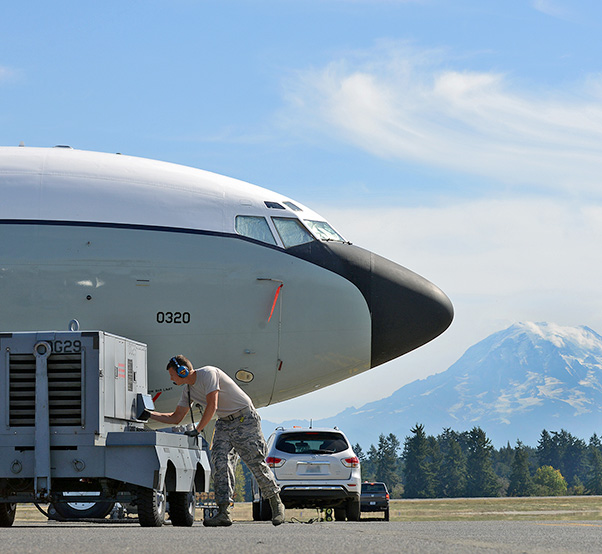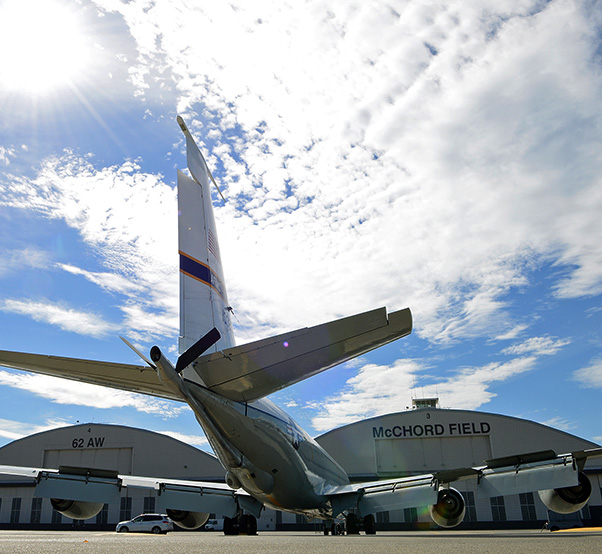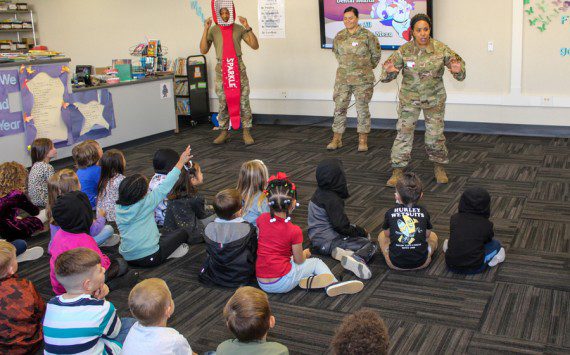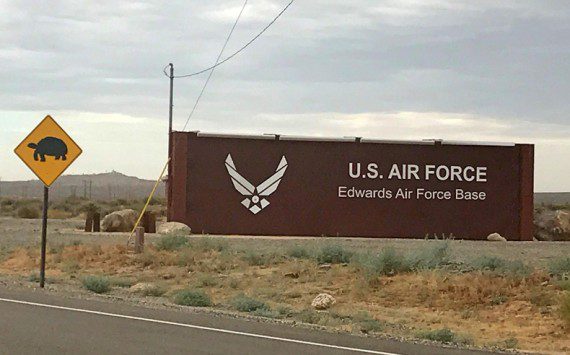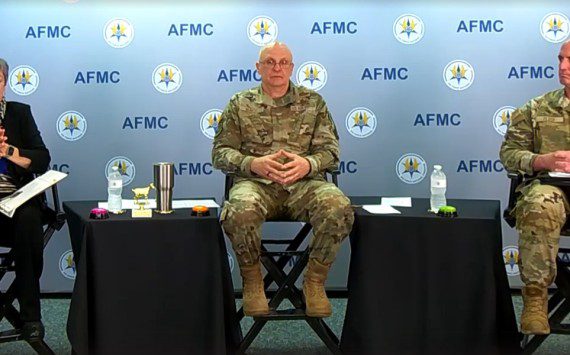With a view of Mt. Rainier in the background, Senior Airman Andres Elias (left), 412th Aircraft Maintenance Squadron assistant dedicated crew chief, begins a walk-around inspection near the wing of an Edwards Air Force Base F-16 Falcon on Sept. 24, 2015 at Joint Base Lewis-McChord, Wash., in preparation for the KC-46 Pegasus first flight. Elias is just one of 20 Edwards AFB personnel temporarily assigned to JBLM in support of the KC-46 Tanker Program.
JOINT BASE LEWIS-MCCHORD, Wash.–On Sept. 25, 2015, the U.S. Air Force, Boeing and aviation enthusiasts witnessed an important milestone with the first flight of the KC-46 Pegasus tanker from Paine Field in Everett, Wash., to Boeing Field in Seattle.
What most didn’t witness is what led up to this milestone, which involved a massive, joint undertaking of several organizations, based out of Joint Base Lewis-McChord, who will continue to be involved with future testing of this military version tanker as part of the KC-46 Tanker Program.
Of the organizations, now functioning from JBLM, the 416th Flight Test Squadron and 412th Aircraft Maintenance Squadron from Edwards Air Force Base, Calif., will be providing up to three F-16s for KC-46 test support, which JBLM has housed since September.
“The KC-46 will accomplish test flights out of Everett and Boeing Field as they’re going through their flight test operations, but the test program also required photo, safety chase and receiver aircraft support, so we’re staging out of McChord Field because it was more suitable for support aircraft operations per the final site survey that our team leads performed,” said Capt. Daniel Alex, 416th FLTS test pilot. “We’ll fly out of McChord Field and rejoin with the KC-46 in the airspace. We will also be rotating aircrew roughly every two weeks at a time in support of this program.”
Senior Airman Andres Elias (left), 412th Aircraft Maintenance Squadron assistant dedicated crew chief, and Senior Airman Blake Holmes, 412th AMXS avionics specialist, conduct a walk-around inspection near the aft end of an F-16 Falcon Sept. 24, 2015 at Joint Base Lewis-McChord, Wash. The F-16s are attached to the 416 Flight Test Squadron at Edwards Air Force Base, Calif., but will act as photo and safety chase aircraft support for KC-46 flight test operations in Washington for the next 11 to 15 months.
Another factor to the joint partnership involves bringing in personnel from the 412th Aircraft Maintenance Squadron, 416th Aircraft Maintenance Unit from Edwards AFB, as well as other AF units who will provide receiver aircraft for the KC-46 program. They’re needed to provide maintenance on support aircraft and also provided safety training to pertinent JBLM personnel who will be supporting fighter and tanker support aircraft operations, according to Tim O’Hearn, 418th FLTS project manager and 412th Test Wing lead for KC-46 support aircraft basing.
“So far, we have nine maintenance personnel supporting two F-16s, but we also have an embedded Reserve service member who lives in the local area and an Edwards aircraft ground equipment specialist who is training JBLM personnel who may not be familiar with our equipment,” said Master Sgt. Ronald Dohmann, 412th Aircraft Maintenance Squadron lead pro super. “We also have an Edwards’ fuels shop specialist to train on hydrazine safety who has been running a three-day course with the JBLM Fire Department, ranging from Air Force, Army and civilian.”
Before getting established, the team also had to look at all the aspects of ground support, which included environmental conditions and acquiring the appropriate aircraft ground equipment needed to operate each support air plane.
“I think this endeavor has been pretty exciting for our maintainers. At Edwards, our maintainers are exposed to a desert environment and JBLM is certainly different than that. The cold weather and rain at JBLM provides new challenges that we must face and overcome,” said Paul Boyce, 416th FLTS logistics manager. “We’ve had to prepare for wearing cold-weather gear and rain gear because back home we don’t need it. The vast amounts of rain we’re expecting at JBLM has caused us to change the criteria we use for our tires. We’ve also had to coordinate with the local folks here about de-icing issues to make sure so all potential areas of concern are covered.”
As a C-17 Globemaster III passes by in the background, Senior Airman Andres Elias (left), 412th Aircraft Maintenance Squadron assistant dedicated crew chief, covers the test instrumentation pitot tube of an Edwards Air Force Base F-16 Falcon on Sept. 24, 2015 at Joint Base Lewis-McChord, Wash., in preparation for the KC-46 Pegasus first flight. Elias is just one of 20 Edwards AFB personnel temporarily assigned to JBLM in support of the KC-46 Tanker Program.
“For us, coming from a traditional Air Force flight and ground test environment and arriving here, there were a lot of learning curves at first, but it’s all worked out and I couldn’t have asked for a better operation out of the JBLM construct and the Washington 95th Air National Guard, who provided their former facility and furniture,” added Dohmann.
According to O’Hearn, one of the most essential taskers leading up to this was working to get the Memorandum of Agreement (MOA) approved among all the pertinent agencies.
“We basically set up a composite wing and a focal point to coordinate all the operations in support of the KC-46. We have six different airframes that include the F-16 Fighting Falcon, F-15E Strike Eagle, A-10 Warthog, the KC-135 Stratotanker, KC-10 Extender and C-17 Globemaster III arriving at JBLM throughout the duration of the KC-46 testing. It’s a pretty big footprint,” said O’Hearn. “The site agreement manager at JBLM, Katie Benoit, was instrumental in getting the right people to the table and coordinating the MOA through the JBLM and 62 AW organization and leadership.”
As part of the MOA, O’Hearn noted 412TW and other Air Force units would be providing support aircraft for the program coupled with the support at JBLM from the U.S. Army Installation Management Command, the 62nd Airlift Wing, the 95th Air National Guard, the Air National Guard Bureau and all the JBLM agencies on station are essential to the success of this operation.
“In this case, because it’s long term duration with a lot of personnel, the MOA written for this undertaking is pretty comprehensive, involving services that personnel would need if they were at their home station, but the entire JBLM team has been very supportive,” O’Hearn said.
The additional piece to this joint effort is the 418th Flight Test Squadron and 412 Maintenance Group, who basically started the planning process with site surveys, according to O’Hearn.
Chad Farmer, 412th Maintenance Squadron aircraft fuels systems trainer and lead, trains Joint Base Lewis-McChord, Wash., fire department personnel as part of initial training on how they should approach an aircraft during an initial hydrazine response, recovery and isolation incident.
“The 418th Flight Test Squadron is executing this responsibility for the 412th Test Wing and has contributed thousands of hours over the past three-plus years with the test planning effort that assisted in achieving this test milestone,” said Charles Cain, 412th Test Wing KC-46 project manager. “The 418th FLTS is supported by Detachment 1 in Seattle, which directly supports the execution of this first flight test.”
A key and final component to the entire operation was JBLM.
“The original request came in to the 62nd Airlift Wing, so Kevin Parret, 62nd AW plans analyst, and I discussed it and we quickly came to the conclusion that this was definitely a bigger undertaking than McChord, so we contacted JBLM for support,” said John Schmedake, 62nd Airlift Wing Plans and Programs Office chief.
During the flight tests, JBLM will provide people and equipment necessary to facilitate pertinent support for the personnel and aircraft involved with KC-46 flying operations. In total, for the 412th TW and AF units, there will be approximately 120 personnel at JBLM involved in the direct support of test and evaluation for the KC-46.
“As an Air Force member working for the U.S. Army at JBLM, it was great to be able to be a part of something that’s so important to the Air Force and then bring all the support that JBLM can provide,” added JBLM deputy chief of staff Air Force Lt. Col. Andy McQuade.
“As we look to understand why joint basing was established and what the benefits are, this is a great example of how it can potentially work to facilitate good relationships between the services that are working on those joint bases. I think we have come together in a way that shows the great example of the successes of joint basing and the KC-46 support test team has been able to leverage all the support that’s here.”
The test program is tentatively scheduled to last approximately 15 months, concluding in December 2016.
A 912th Aircraft Maintenance Squadron maintainer removes the tail stand off a KC-135 Stratotanker on Sept. 24 at Joint Base Lewis-McChord, Wash., in order to support the KC-46 Pegasus first flight. The KC-135 is attached to Edwards Air Force Base, Calif., but will intermittently fly out of JBLM in order to support KC-46 flight test operations throughout the next 11 to 15 months.
Tech Sgt. Joshua Scott, 912th Aircraft Maintenance Squadron avionics NCOIC, prepares to start a power cart for a KC-135 Stratotanker on Sept. 24, 2015 at Joint Base Lewis-McChord, Wash. The KC-135 was there to support the KC-46 Pegasus first flight and will be there for future testing of the KC-46 Tanker Program.
A KC-135 Stratotanker from Edwards Air Force Base, Calif., will intermittently fly out of Joint Base Lewis-McChord, Wash., in order to support KC-46 flight test operations throughout the next 11 to 15 months as part of the KC-46 Tanker Program.






